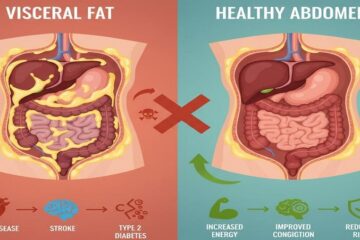Depression is much more than feeling sad at all times. It is a serious mental health impairment that affects millions globally. According to the World Health Organization (WHO), more than 280 million people worldwide live with sadness.
Although most people think that depression affects mental health, it also affects the body. It messes with your hormones, slows down your digestion, and makes you feel tired all the time. These changes often cause weight gain (or weight loss) and other health problems.
In this blog, we will discover the relationship between sadness and weight gain and this hidden health crisis.
How depression causes weight gain
1. Emotional food and desires
Depression often brings emotional problems. Many people refer to food as a competing method, especially high lion, high -fat relief foods. It increases the levels of serotonin and dopamine in the body, which makes it a moment of relief.
However, over time, this emotional food increases weight gain.
2. Anxious sleep
The sadness is closely linked to the irregularities of sleep. Poor sleep, as a result, causes an increase in appetite, which gradually leads to weight gain.
3. Low energy levels
People with depression often feel very tired to engage in physical activity. Even everyday tasks feel like a burden on them. This inactivity, combined with hunger, causes weight gain and obesity.
4. Metabolic changes and hormonal shifts
Chronic depression increases stress in the body. It promotes fat storage and changes the way your body metabolizes calories. In this way, despite a balanced diet, it is difficult to lose weight.
5. Antideepressants
Some medicines used to treat depression can also lead to weight gain. Although not everyone loses weight on these medicines, for some people, this can have a significant impact.
Who is in danger?
Although weight gain can affect anyone, some people are at greater risk.
- Female: Women suffer from sudden weight gain during puberty, pregnancy, or menopause. It causes emotional eating, physical dissatisfaction, and weight gain.
- Persons with chronic illnesses: Long -term health, such as diabetes, PCOS, thyroid, or chronic pain, often suffer from emotional stress. This increases the risk of depression and weight gain.
- Persons with family history of depression or obesity: If your family has obesity and sadness, you can be more sensitive to both of you.
- Individuals on long -term antidote to use: Some medicines, such as SSRI or trysical anti -depressants, have been linked to weight gain, especially if taken longer without the permanent supervision of a health care professionals.
How to manage depression -related weight gain
1. Get the right professionals support
Consult weight loss doctors and mental health physicians. Psychologists, psychologists, and board certified obesity medical physicians, such as Dr. Mona Lala, can help plan a treatment that works for your brain and body.
2. Keep a check on your medicines
If you are on anti -depressants and take notice of a significant weight increase, talk to your doctor. Alternatives or diet adjustments can help you handle your mental health without compromising your physical fitness.
3. Move your body at your speed
Join exercise and physical activities that promote mood and reduce symptoms related to depression. You don’t have to target the gym for it, even light activities, such as walking, pulling, or yoga, is a good way to move your body.
4. Follow the food minds of the food
Pay attention to what, when, and how much you are eating. Eating brainstorming helps you to control and build better relationships with food.
5. Contributing with others
Join a support group. Share your journey with others and get encouragement, indicators and emotional support you need to stay on track.
Does sadness also cause weight loss?
Yes Although most people experience depression and weight gain, some also experience depression and weight loss. It is usually caused by a lack of interest in eating, changes in taste of taste, or gastrointestinal discomfort due to chronic stress.
Over time, it can lead to weight loss and depression.
Get professional support if you are suffering from depression and weight issues
If you are struggling sadly and look at your weight changes (whether it be benefits or loss), consider seeking professional help.
Whether it is through therapy, adjustment in medicines, lifestyle changes, or nutrition guidance, professional support can make a real difference in the way you guide your life.
To prepare a comprehensive plan according to your unique needs, consider a consultation schedule with the board certified obesity medicine physician physician Dr. Mona Lala. Depression and weight problems can be linked, but with the right care, they do not need to explain your life.



0 Comments